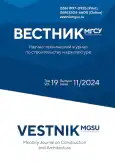Strategic planning of innovation activities of a construction enterprise in the projection of a system-network approach
- Authors: Lukmanova I.G.1, Vlasenko V.A.1, Uvarova S.S.1
-
Affiliations:
- Moscow State University of Civil Engineering (National Research University) (MGSU)
- Issue: Vol 19, No 11 (2024)
- Pages: 1850-1860
- Section: Technology and organization of construction. Economics and management in construction
- URL: https://bakhtiniada.ru/1997-0935/article/view/276621
- ID: 276621
Cite item
Full Text
Abstract
About the authors
I. G. Lukmanova
Moscow State University of Civil Engineering (National Research University) (MGSU)
Email: lukmanova@mgsu.ru
ORCID iD: 0000-0002-2835-8181
V. A. Vlasenko
Moscow State University of Civil Engineering (National Research University) (MGSU)
Email: slava.vasenko.80@mail.ru
ORCID iD: 0000-0003-0307-8930
S. S. Uvarova
Moscow State University of Civil Engineering (National Research University) (MGSU)
Email: uvarova_s.s@mail.ru
ORCID iD: 0000-0002-9385-8182
References
- Trabskaja J., Mets T. Ecosystem as the Source of Entrepreneurial Opportunities. Foresight and STI Governance. 2019; 13(4):10-22. doi: 10.17323/2500-2597.2019.4.10.22
- Gumba K., Belyaeva S. Specific character of sustainable innovative development of transport construction in self-regulation conditions. IOP Conference Series: Earth and Environmental Science. 2017; 90:012163. doi: 10.1088/1755-1315/90/1/012163. EDN ZWGDFD.
- Kopmann J., Kock A., Killen C.P., Gemünden H.G. The role of project portfolio management in fostering both deliberate and emergent strategy. International Journal of Project Management. 2017; 35(4):557-570. doi: 10.1016/j.ijproman.2017.02.011
- Chen W., Yu M., Hou J. Synergistic Relationship, Agent Interaction, and Knowledge Coupling: Driving Innovation in Intelligent Construction Technology. Buildings. 2024; 14(2):542. doi: 10.3390/buildings-14020542
- Gumba K., Belyantseva O., Kochetova L. Justification of the Sources of Forming Competitive Advantages of Underground Construction Companies under the Production Concentration Conditions. Procedia Engineering. 2016; 165:1323-1327. doi: 10.1016/j.proeng.2016.11.858. EDN XGOJWZ.
- Gumba K., Uvarova S., Belyaeva S., Vlasenko V. Innovations as sustainable competitive advantages in the digital economy: substantiation and forecasting. E3S Web of Conferences. 2021; 244:10011. doi: 10.1051/e3sconf/202124410011. EDN OLKJIM.
- Lekan A., Clinton A., Owolabi J. The disruptive adaptations of Construction 4.0 and Industry 4.0 as a pathway to a sustainable innovation and inclusive industrial technological development. Buildings. 2021; 11(3):79. doi: 10.3390/buildings11030079
- Walker D.H., Davis P.R., Stevenson A. Coping with uncertainty and ambiguity through team collaboration in infrastructure projects. International Journal of Project Management. 2017; 35(2):180-190. doi: 10.1016/j.ijproman.2016.11.001
- Zhang X., Le Y., Liu Y., Liu M. Fostering ambidextrous innovation in infrastructure projects: Differentiation and integration tactics of cross-functional teams. Journal of Construction Engineering and Management. 2021; 147(6). doi: 10.1061/(ASCE)CO.1943-7862.0002060
- Lo J.T., Kam C. Innovation of organizations in the construction industry: Progress and performance attributes. Journal of Management in Engineering. 2022; 38(6). doi: 10.1061/(asce)me.1943-5479.0001093
- Golov R., Smirnov V., Narezhnaya T., Ovsyannikova A., Zhutaeva E., Sizova E. et al. Adaptation of industrial and energy enterprises to the implementation of the concept of open innovation. E3S Web of Conferences. 2019; 110:02130. doi: 10.1051/e3sconf/201911002130. EDN FWLUHS.
- Bivand R. Spatial diffusion and spatial statistics: Revisting hägerstrand’s study of innovation diffusion. Procedia Environmental Sciences. 2015; 27:106-111. doi: 10.1016/j.proenv.2015.07.103
- Bhatti S.H., Zakariya R., Vrontis D., Santoro G., Christofi M. High-performance work systems, innovation and knowledge sharing. Employee Relations: The International Journal. 2020; 43(2):438-458. doi: 10.1108/ER-10-2019-0403
- Ding X., Feng L., Huang Y., Li W. The interactive effects of communication network structure and organizational size on task performance in project-based organizations: The mediating role of bootleg innovation behavior. Buildings. 2024; 14(1):98. doi: 10.3390/buildings14010098
- Tipili L.G., Ojeba P.O., Ilyasu M.S. Evaluating the effects of communication in construction project delivery in Nigeria. Global Journal of Environmental Science and Technology. 2014; 2(5):48-54.
- Shi Q., Chen X., Xiao C., Han Y. Network perspective in megaproject management : а systematic review. Journal of Construction Engineering and Management. 2022; 148(7). doi: 10.1061/(ASCE)CO.1943-7862.0002304
- Adner R. Ecosystem as Structure. Journal of Management. 2017; 43(1):39-58. doi: 10.1177/0149206316678451
- Sizova E., Zhutaeva E., Gorshkov R. Methodical bases for forming the structure of management of innovative activity of large building holdings. MATEC Web of Conferences. 2018; 170:01126. doi: 10.1051/matecconf/201817001126
- Wang N., Gong Z., Xu Z., Liu Z., Han Y. A quantitative investigation of the technological innovation in large construction companies. Technology in Society. 2021; 65:101533. doi: 10.1016/j.techsoc.2021.101533
- Vlasenko V.A. Formation of sustainable competitive advantages in the development of a construction company strategy based on value innovation. Real Estate: Economics, Management. 2023; 3:37-41. doi: 10.22337/2073-8412-2023-3-37-41. EDN BZTQPD.
- Sörlin S. Hägerstrand as historian: innovation, diffusion and the processual landscape. Landscape Research. 2020; 45(6):712-723. doi: 10.1080/01426397.2020.1790506
- Tyapukhin A.P. Logistics and supply chain management: a new sight. Deutschland, Saarbrücken, LAP Lambert Academic Publishing, 2012; 127.
- Gumba K., Belyantseva O., Kochetova L. Justification of the sources of forming competitive advantages of underground construction companies under the production concentration conditions. Procedia Engineering. 2016; 165:1323-1327. doi: 10.1016/j.proeng.2016.11.858. EDN XGOJWZ.
- Yaskova N., Kolosova T. The investment and construction activities transformation at the modern development stage of Russia. IOP Conference Series: Materials Science and Engineering. 2020; 869(6):062050. doi: 10.1088/1757-899X/869/6/062050
Supplementary files





